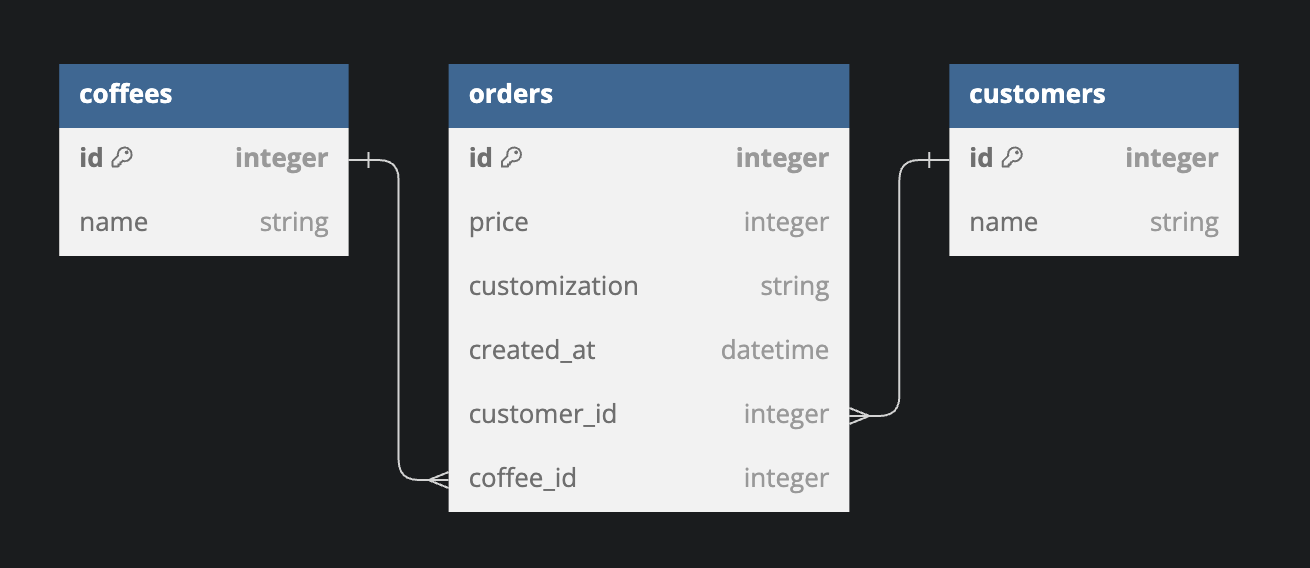For this assessment, you'll be working with a Coffee Shop domain.
In this repo:
- There is a Flask application with some features built out.
You can either check your API by:
- Using Postman to make requests
- Building out a React frontend
To download the dependencies, run:
pipenv install
pipenv shellYou can run your Flask API on localhost:5555 by
running:
python server/app.pyYour job is to build out the Flask API to add the functionality described in the deliverables below.
You will implement an API for the following data model:
The file server/models.py defines the model classes without relationships.
Use the following commands to create the initial database app.db:
export FLASK_APP=server/app.py
flask db init
flask db upgrade headNow you can implement the relationships as shown in the ER Diagram:
- A
Customerhas manyCoffees throughOrder - A
Coffeehas manyCustomers throughOrder - A
Orderbelongs to aCustomerand belongs to aCoffee
Update server/models.py to establish the model relationships. Since a
Order belongs to a Customer and a Coffee, configure the model
to cascade deletes.
Set serialization rules to limit the recursion depth.
Run the migrations and seed the database:
flask db revision --autogenerate -m 'message'
or
flask db migrate -m 'message'
flask db upgrade head
python server/seed.pyIf you aren't able to get the provided seed file working, you are welcome to generate your own seed data to test the application.
Add validations to the Order model:
- must have a
pricegreater than or equal to 2
Add validations to the Coffee model:
- must have a unique
name
Set up the following routes. Make sure to return JSON data in the format specified along with the appropriate HTTP verb.
Recall you can specify fields to include or exclude when serializing a model instance to a dictionary using to_dict() (don't forget the comma if specifying a single field).
NOTE: If you choose to implement a Flask-RESTful app, you need to add code to
instantiate the Api class in server/app.py.
Return JSON data in the format below:
[
{
"id": 1,
"name": "Mocha"
},
{
"id": 2,
"name": "Flat White"
},
{
"id": 3,
"name": "Latte"
}
]Recall you can specify fields to include or exclude when serializing a model
instance to a dictionary using to_dict() (don't forget the comma if specifying
a single field).
If the Customer exists, return JSON data in the format below:
{
"id": 1,
"name": "Karen",
"orders": [
{
"coffee": {
"id": 1,
"name": "Mocha"
},
"coffee_id": 1,
"created_at": "2023-11-18 03:02:03",
"customer_id": 1,
"customization": "iced",
"id": 1,
"price": 5
}
]
}If the Customer does not exist, return the following JSON data, along with
the appropriate HTTP status code:
{
"error": "Customer not found"
}If the Coffee exists, it should be removed from the database, along with
any Orders that are associated with it (a Order belongs
to a Coffee). If you did not set up your models to cascade deletes, you
need to delete associated Orders before the Coffee can be
deleted.
After deleting the Coffee, return an empty response body, along with the
appropriate HTTP status code.
If the Coffee does not exist, return the following JSON data, along with
the appropriate HTTP status code:
{
"error": "Coffee not found"
}Return JSON data in the format below:
[
{
"coffee": {
"id": 3,
"name": "Latte"
},
"created_at": "2023-11-18 03:02:03",
"customer": {
"id": 3,
"name": "Sanjay"
},
"customization": "oat milk",
"id": 5
},
{
"coffee": {
"id": 3,
"name": "Latte"
},
"created_at": "2023-11-18 03:02:03",
"customer": {
"id": 2,
"name": "Abby"
},
"customization": "iced, oat milk",
"id": 6
}
]This route should create a new Order that is associated with an
existing Coffee and Customer. It should accept an object with the following
properties in the body of the request:
{
"coffee_id": 1,
"customer_id": 3,
"price": 5,
"customization": "almond milk, iced"
}If the Order is created successfully, send back a response with the
data related to the Order:
{
"coffee": {
"id": 1,
"name": "Mocha"
},
"coffee_id": 1,
"created_at": "2023-11-18 03:22:39",
"customer": {
"id": 3,
"name": "Sanjay"
},
"customer_id": 3,
"customization": "almond milk, iced",
"id": 7,
"price": 5
}If the Order is not created successfully due to a validation
error, return the following JSON data, along with the appropriate HTTP status
code:
{
"errors": ["validation errors"]
}